Dental Implants FAQAre there age limits for Dental Implants?
No, there are no upper age limitations and very few medical conditions that prevent successful dental implant treatment. We have provided implants for patients from 18 - 90 years of age.
Do Dental Implants hurt? No, dental implant treatment is like having a filling or extraction and the procedure does not hurt in the slightest. Because the procedure is delicate and takes time we offer free IV sedation for patients who may want it.
What is involved in having a dental implant?
There are three steps involved in implant treatment. First the implant screw is placed surgically along with any bone graft required. After a suitable healing time, that varies between each person, a simple second stage procedure is complete to expose the buried implant. Finally the artificial tooth is made and screwed or cemented to the implant.
How long do Implants last?
If cared for properly, the implant screw in your bone will last for a very long time, maybe your entire life. The teeth screwed to the implants are subject to normal wear and tear and require periodic maintenance. Dental implants are currently the most long term and predictable procedure in dentistry.
What are dental implants made of?
The screw portion is made of commercially pure titanium and sometimes a titanium alloy. The oxide layer on the implant, remarkably, stimulates no foreign body reaction in the patient and the bone bonds to its surface.
Do dental implants look like teeth?
Good implants do, poorly placed implants do not. The skill of the surgeon and prosthodontist enable results that are just like teeth. You may have seen people with implants that do not look good and are worried this will happen to you. With careful planning and use of bone and gum grafting we can avoid or minimise most of these problems.
Do Dental Implants feel like teeth?
You have little sensation from a dental implant, so they feel slightly different from natural teeth. Implants however are much more like teeth than dentures or dental bridges. Often the teeth can be kept separate and can be flossed like teeth. Implant crowns also emerge from the gum like teeth.
.
Why would I need a bone graft?
A implant works best, long term if it is encased totally in bone. If you have bone loss due to infection, fractured roots or long periods without a tooth in a site, you may require some bone grafting, this is so we can place the implant in the ideal position & totally covered in bone. This precision allows us to create more realistic results and avoid the appearance of long looking teeth. Bone grafting is required only in some cases.
Why would I need a Sinus lift procedure?
If you have been missing a tooth in back of the upper jaw, you may have very little bone between your air sinus and mouth to place implants. We can predictably create bone in this area using an internal or external sinus lift procedure.
Can I have a tooth removed and a dental Implant placed the same day?
Yes, often this is possible and is called immediate placement. Sometimes if there is a lot of infection its best to remove the tooth first and place the implant some time later. Both methods work and your specific situation will decide which we do.
Can I have a tooth on my Implant the day it is placed?
This is possible and is called immediate loading. If the implant is very secure in the bone and the surgeon is happy with the stability, we can place a temporary tooth on the implant. If you need bone grafting, have had an immediate placement or your bone is less than ideal we prefer to offer you a temporary tooth which is not connected to your new implant. This allows it to fuse predictable to the bone.
How long do dental Implants take?
Each person is different. At the very least they will take 3 months, if grafting is done, sinus lifts or in softer bone they may take longer periods to heal.
Do dental implants damage the neighbouring teeth?
No. Unlike bridges, dental implant do not require preparation of the adjacent teeth.
I hear there are many types of dental implants, what kind do you use?
We use only implants with long term research and predictable connections to the prosthetic teeth. Currently our preferred implant is from Southern Venturi, a company with 24 years experience making implants who were cited as one of only 4 companies with enough quality research to be included in the 2005 Cochrane meta-analysis.
Can I have cheaper mini dental implants?
We use mini implants only as temporary implants to support teeth during treatment. Mini implant have shown high failure rates which are not suitable for our patients.
Will my medical insurance pay for my implants?
In certain circumstances your medical insurance will contribute towards your treatment. See here.
Can I have dental implants if I am a grinder?
Yes, Dr. Fitzgerald will control your bite on the implants so as not to put them under too much stress. Bruxism or grinding is a factor we consider but is not a contraindication.
Can I have dental implants if I smoke?
Yes, but you will have a slightly higher chance of an implant failing. We ask you stop smoking or cut down especially around the healing period.
Why should I replace missing back teeth?
Without back teeth your front teeth often start to chip and wear. Also teeth will drift into spaces. You will never have more bone for dental implants than you do today.
What happens if my dental implant fails to heal properly?
We will re-evaluate and often place another implant (free of a second charge). This second implant may require some bone graft. Dental implants can fail but it is a rare complication.
Do I need to go into hospital for dental implant surgery?
No. Hospital stays are expensive and general anaesthetics increase recovery time. IV sedation is our preferred method for placing dental implants.
Will I be without teeth during the dental Implant healing time?
If you require temporary teeth they are provided. For some back teeth, missing for a long time, you may not need temporary replacements. You will never walk out without teeth at any stage if that is your wish.
What is the recovery period? This depends on the type of implant, grafting, the size of the graft and your own particular healing! A full assessment of this can be made at your consultation. All patients receive a prescription and comprehensive written post-operative instructions following a surgical procedure. Sick certificates can be issued on request. 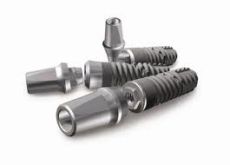 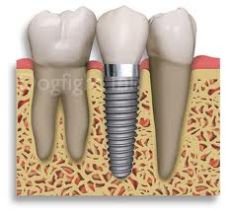 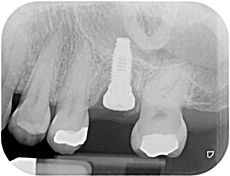 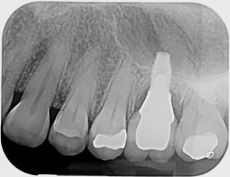 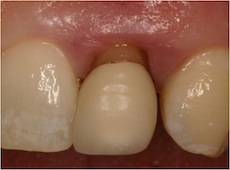 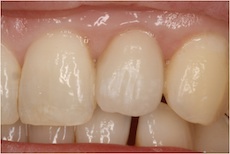 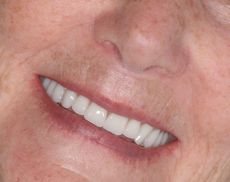 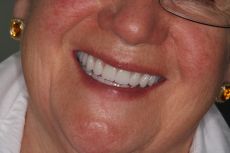 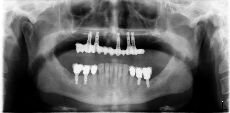 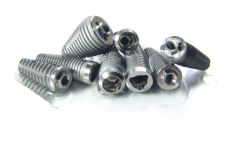 |
